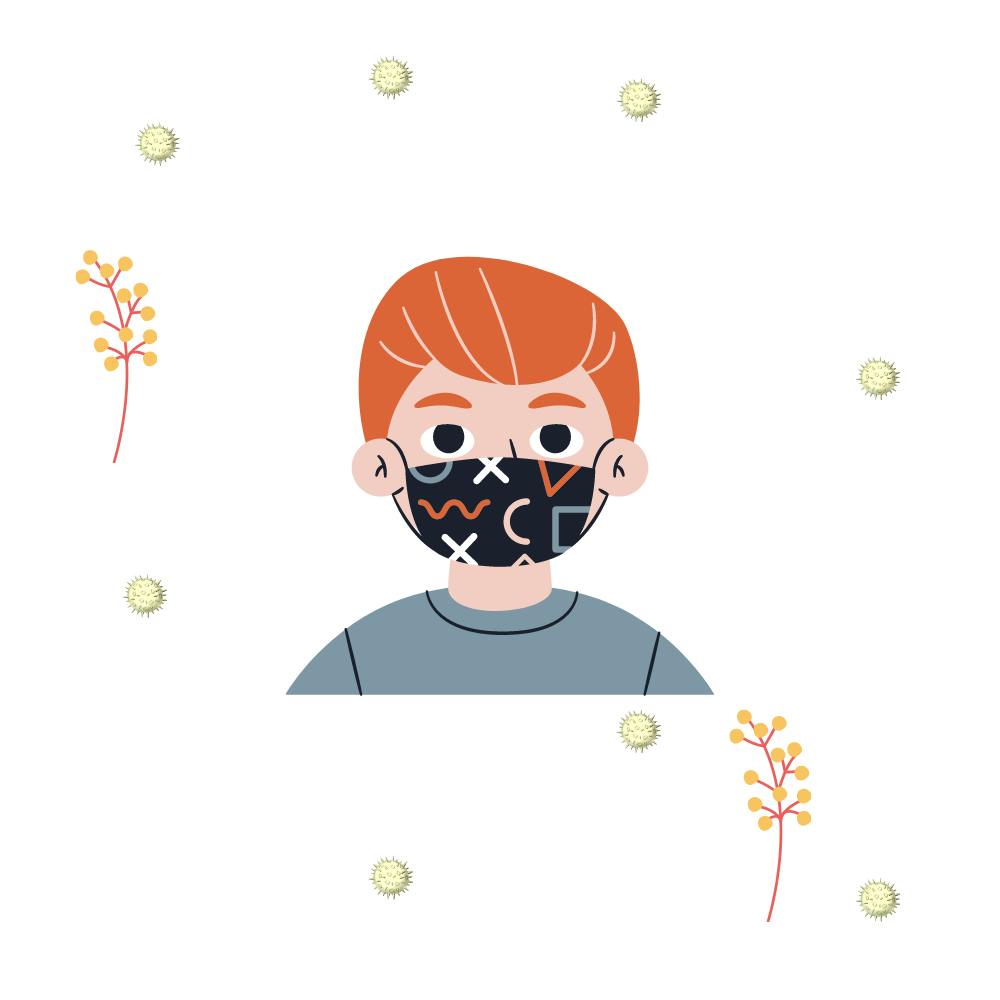A new study could provide relief for seasonal allergy sufferers. The paper, published in The Journal of Allergy and Clinical Immunology, suggests that wearing masks may relieve some symptoms of allergic rhinitis, also known as hay fever.
Wearing masks has become ubiquitous because of the pandemic. While masks keep virus particles out, they may also fend off the main culprits for seasonal allergies: tree pollen, dust mites, pet dander and mold. When these particles are inhaled or come in contact with the eyes, it can cause classic allergy symptoms, including itchiness, inflammation, sneezing and stuffiness.
Pollen tends to be about ten to 100 micrometers in size. In comparison, COVID-19 is 0.1 micrometers (though the virus is usually found in droplets, which are larger). According to an article in The Conversation, masks are netted systems, like spiderwebs, and can trap these particles and droplets. This web is likely also trapping the allergens.
The finding that wearing masks lessens allergy symptoms was somewhat surprising to Dr. Amiel Dror, an author of the paper. Dror is an otolaryngology resident at Galilee Medical Center and a member of the Azrieli faculty of Medicine of Bar-Ilan University in Israel. Dror and his team were originally looking into whether mask fibers and the elastic ribbons which secure the mask could trigger allergic reactions because of the prolonged direct skin contact.
Dr. Sandra Lin, a professor of otolaryngology at the School of Medicine and an expert on allergic rhinitis, was less surprised by these results. In an interview with The News-Letter, she explained that scientists commonly recommend that those with allergies wear masks when they garden or mow the lawn.
Dror and his team administered surveys to 301 nurses over a two-week period. The nurses were quizzed about their allergy symptoms without mask wearing. These descriptions were based on memories of the severity of their symptoms from before the pandemic and their experience on the weekends when they didn’t work.
These nurses then wore either an N-95 or a surgical mask for a week on their 8-12 hour shifts and reported the severity of their symptoms. The majority of nurses switched between the two types of masks for the study, but a small minority could only use one type of mask. Researchers analyzed whether the type of mask made a difference, if both nasal and ophthalmic (eye) symptoms were mitigated and if both persistent and seasonal allergy sufferers experienced a significant benefit.
The researchers found that nurses with seasonal allergies got the most out of wearing masks, reporting much milder nasal symptoms through the two-week period. Both surgical and N-95 masks provided about the same benefit in reducing allergy symptoms. As one may expect, wearing masks did not have a significant effect on ophthalmic symptoms, because masks do not prevent allergens from contacting the eyes.
Nurses who suffer year-round allergies did not experience much improvement because the sources of their allergies, such as dust mite feces, tend to be much more abundant in home and work environments.
Even though the study evaluated the effects of surgical and N-95 masks, cloth masks could have a similar effect, according to Dror and Lin. The fabric mass and type of fabric would have a big influence on how well they work to block allergens.
In an email to The News-Letter, Dror explained that the filtration of pollen and other allergens in the air is key for symptom prevention with any type of mask.
“In essence, every physical barrier that can prevent inspiration of pollen and other potent allergens could achieve a beneficial effect,” he wrote.
Lin cautioned that because allergens can stick around for hours and because there are allergens at home or outside, where people may not be wearing masks, mask wearing would need to be more vigorous than people may think.
“You really need to wear a mask a lot of the time to gain a benefit,” she said. “The nurses in the study were probably wearing masks all day because they were at work, but I think most people are not necessarily doing that because their job may not require it.”
Masks are a more commonly accepted now because of the pandemic. However, Dror noted, this may only be temporary.
“Individuals may now feel more comfortable wearing masks in public, but whether this phenomenon will extend beyond COVID-19 remains to be seen,” he wrote.
Lin is optimistic that the practice of wearing masks in certain situations, such as during travel, bouts of minor colds and in large public locations, will stick around beyond the pandemic. Since people are now more used to wearing masks, they may also be more open to wearing them to ward off severe seasonal allergies.
Unfortunately, mask-wearing will not solve allergies as a whole. Dror and Lin still urge patients experiencing severe seasonal allergies to visit their doctor for effective allergy treatments.
Correction: The original article only mentioned Dror’s affiliation to the Galilee Medical Center. Additionally, he is a member of the Azrieli faculty of Medicine of Bar-Ilan University in Israel.
The News-Letter regrets this error.





